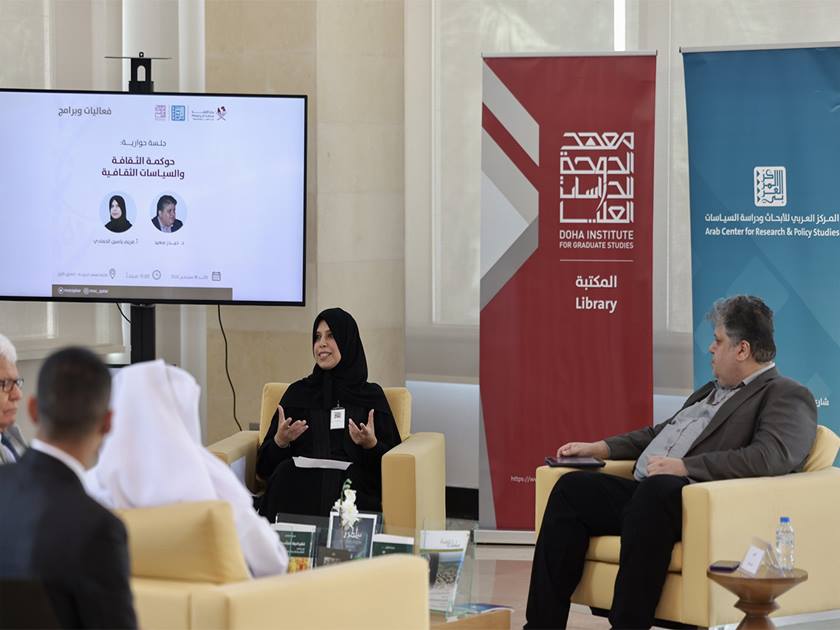Doha, September 18 (QNA) - The Ministry of Culture, represented by the Department of Culture and Arts, held Sunday a seminar entitled "Governance of Culture and Cultural Policies", in collaboration with the Doha Institute for Graduate Studies, at the institute's headquarters.
The seminar, which came as part of the Ministry of Culture's keenness to educate on the cultural strategy adopted by the State of Qatar, was attended by Head of Research Department at the Arab Center for Research and Policy Studies (ACRPS) Dr. Haider Saeed, and Director of the Department of Culture and Arts at the Ministry of Culture Maryam Yassin Al Hammadi.
Saeed addressed the concept of cultural policies as it was presented in the West and called for by the United Nations Educational, Scientific and Cultural Organization (UNESCO). During the UNESCO World Conference on Cultural Policies and Sustainable Development in 1982, the concept of culture transcends tangible heritage, fine arts, and literature to include all the distinctive spiritual, material, intellectual and emotional features characterizing a society or a social group. It also extends to lifestyles, the basic rights of human beings, and the system of traditions and beliefs.
Addressing the role of the state and its official agencies in formulating its desired cultural policies that it adopts, Saeed said that there are a set of proposals contributing to fostering the concept of culture, including approaches by ministries of culture worldwide to form advisory councils of cultural elites that work on enriching and diversifying the cultural scene. He stressed that cultural policies are not confined to intellectuals but rather need collective partnerships by the ministries of culture and state agencies to back and develop culture.
He also called for holding a periodic conference for the cultural community to develop mechanisms that define cultural policies in the fields of arts and literature, museums, and other cultural domains in a way that contributes to the development of the cultural product, with the need for supportive and sponsoring bodies for cultural production.
Al Hammadi, for her part, affirmed the keenness of the Ministry of Culture to continue its seminars, which cover several special areas in the issues included in the State of Qatar's cultural strategy, highlighting the coordination for several seminars and discussion panels that contribute to strengthening cultural dialogue in society.
She pointed out that the cultural policy in the State of Qatar is based on the privacy of the Qatari society, as a conservative one, noting that the Ministry of Culture follows an open and flexible policy and deals with the issues that arise in reality. She stressed that the most important foundations on which culture in the State of Qatar depends are national legislation, especially the Constitution of the State of Qatar, where culture in the State depends on a basic reference that defines the features of its cultural policy.
She touched on the most important legislation regulating cultural work in Qatar, where cultural institutions and bodies in the country are divided into different types according to the founding decision, which defines the nature of the institution, its objectives, its work and its relationship with the Ministry of Culture and other ministries.
She highlighted in this regard the bodies working in the field of culture, including for example the Ministry of Culture-affiliated institutions and centers that are established by a decision of HE the Minister of Culture, and are financially and logistically supported in order to provide cultural support in the country. She also noted the elections that bring members of these institutions, adding the members bear responsibility for all the center’s activities and the related oversight systems in the country including the governance of non-profit organizations.
Al Hammadi highlighted the types of independent cultural institutions including private cultural institutions that provide cultural, advisory or training services and the private cultural institutions of public interest which seek to improve the society, in a way that integrates with the work of the relevant ministries and is regulated by their own law. (QNA)
18 September 2022
Ministry of Culture Holds "Governance of Culture and Cultural Policies" Seminar
Local
Keywords
Culture, Qatar
News Bulletins
Most Read


